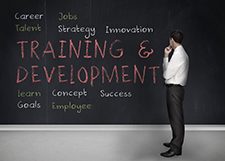Are you spooked by interview questions that are difficult to answer? Interviews can be scary, but they don’t have to be. Take a look at these common interview questions and click each link to discover tips for answering them with ease.
Why are you looking for a change?
What are your greatest weaknesses?
Why is there a gap in your work history?
How do you answer scary interview questions? Let us know in the comments section below!
Movin’ On Up is brought to you by Express Employment Professionals.



 Scoring a job interview with a company you’re excited to work for is always a positive thing. But, you still may experience the famous mix of anticipation and dread that goes along with an interview.
Scoring a job interview with a company you’re excited to work for is always a positive thing. But, you still may experience the famous mix of anticipation and dread that goes along with an interview.


